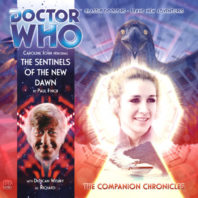
Released April 2011
Set some time after Liz Shaw left UNIT for Cambridge, the Third Doctor’s former companion calls on him to help investigate experiments with time dilation in ‘The Sentinels of the New Dawn’ by Paul Finch. When the two are thrust forward to the year 2014, however, promises of an ideal new era for humanity instead reveal a burgeoning political movement founded upon malign intent.
Paul Finch is the adapter of ‘Leviathan,’ an entry in The Lost Stories audio range stemming from his father. ‘The Sentinels of the New Dawn’ acts as a prequel to that tale, helping to fill in the gaps about this group of individuals that the Sixth Doctor would come to hold such disdain for in his future. The premise is a fascinating one as the Doctor is reunited with a more scientific mind after a rough beginning with his new assistant, Jo Grant. Liz may not be an expert in time travel, but she realises that the initial experiments of her Department of Applied Mathematics and Physics colleague appear to be close to succeeding. Academia is her natural calling, but she can’t help but think back on her time with UNIT and what she gave up to pursue this path given how uneventful it can at times seem. Fortunately, she is able to draw upon the straightforward and direct relationship she had with the Doctor to bridge any lingering feelings that resulted from her departure, and it’s this adventure with New Dawn that finally gives her the peace of mind that she has decided correctly.
The time window created is likewise an intriguing concept, allowing an individual to monitor certain events from another time without being seen or being allowed to actually interact or interfere. Unfortunately, New Dawn has been able to exploit the technology to peer into the future and wisely invest for maximum return. Linking their device with the original Cambridge prototype, members of this group are able to bring the Doctor and Liz whom they believe to be the two original creators of this technology to their own time, hoping to eventually make everyone within their organisation utterly impregnable given the knowledge and foreknowledge they can attain. Hiding behind seemingly philanthropic activity like providing free medical care to impoverished portions of the planet, New Dawn’s furtive intentions to craft biological weapons to gain control of the world is a trusted villainous trope that lends a modern element to a classic era befitting of this setting.
The unique perspective of the returning companion and topical plot points certainly create an intriguing backdrop for ‘The Sentinels of the New Dawn,’ but there isn’t quite enough work done to elevate the storyline to something more profound. The Doctor acts much the same as he always does, and whereas his more reserved and quiet demeanour at certain points could have been explored in terms of reuniting with Liz or looking at a potential means of escaping his exile, this is instead played off as being part of his plan to fool his captors. While there’s nothing intrinsically wrong with this approach and is unquestionably within character, it does leave some of the potential character work yearning to be explored untouched. Even the creature that New Dawn has created is monstrous with no hint of a deeper backstory of conflicted sense of purpose, and a formative figure praising the actions of the Nazis before an assembled crowd takes away any nuance from the central conflict in play. None of this, however, takes away from a brilliant performance from Caroline John that is accompanied in support by Duncan Wisbey and by the usual strong direction and sound design, but the sum of ‘The Sentinels of the New Dawn’ is not quite equal to the potential of its component parts, and the twist ending is something of an odd one for the normally shrewd Liz to miss as the formation of New Dawn proves to be inevitable no matter Liz’s actions in limiting one potential avenue of its development.
- Release Date: 4/2011


Leave a Reply